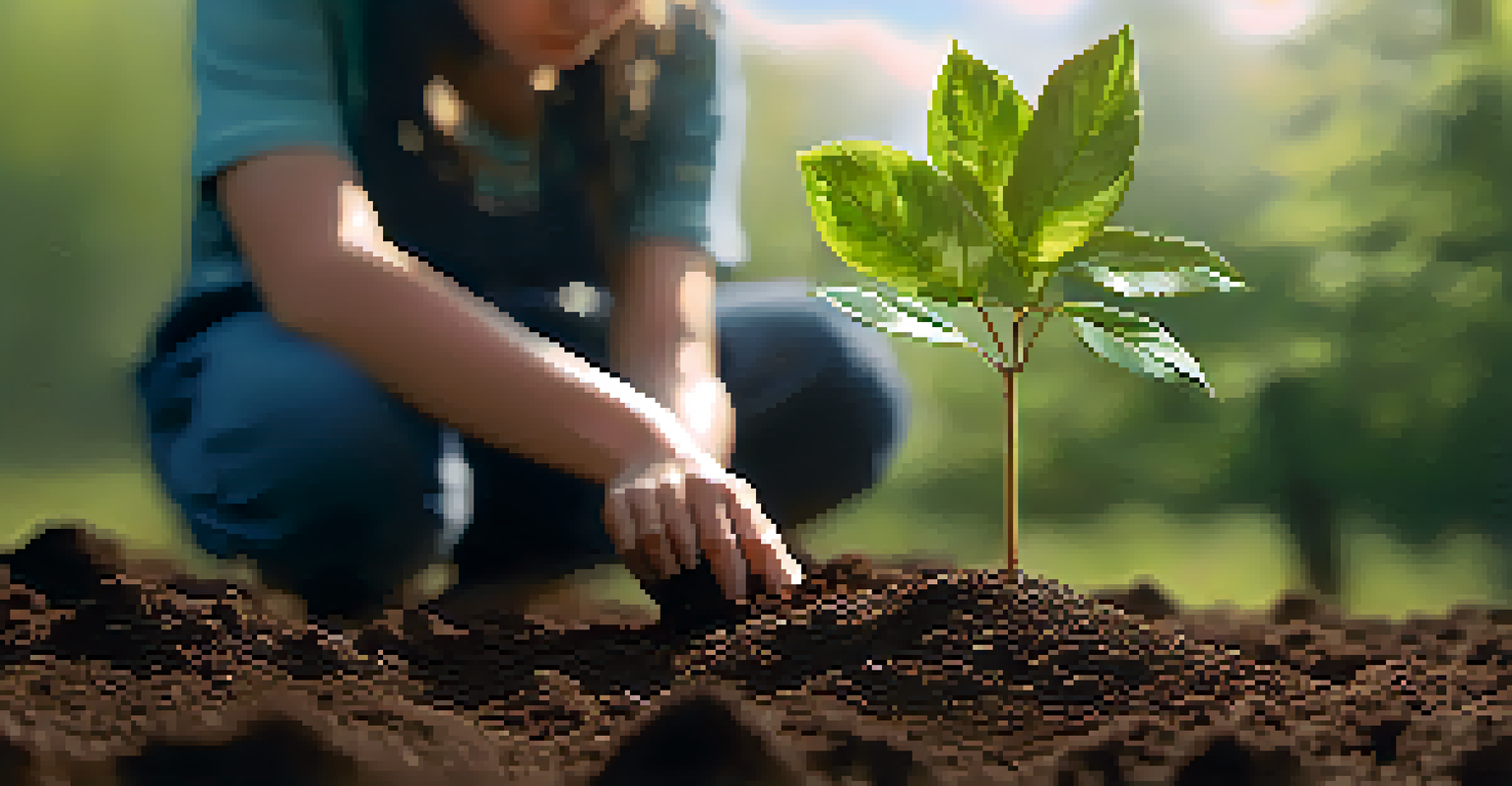Spiritual Practices That Encourage Sustainable Living

Mindfulness: Cultivating Awareness of Our Impact
Mindfulness encourages us to be present and aware of our surroundings, fostering a deeper connection with nature. By practicing mindfulness, we can recognize the impact of our actions on the environment, leading to more conscious choices. For example, when we eat, being mindful can help us appreciate where our food comes from and the resources it consumes.
The greatest threat to our planet is the belief that someone else will save it.
This awareness can motivate us to choose sustainable options, such as local produce or plant-based meals. By integrating mindfulness into our daily routines, we develop a habit of considering the ecological footprint of our decisions. Ultimately, this practice nurtures a sense of responsibility and connection to the planet.
As we become more mindful, we can also cultivate gratitude for the natural world, reinforcing our commitment to protecting it. This shift in perspective helps us see sustainability not just as a trend, but as a vital part of our spiritual journey.
Meditation: Connecting with Nature's Energy
Meditation offers a chance to connect deeply with ourselves and the world around us. By incorporating nature-based meditations into your practice, you can tap into the energy of the earth, fostering a sense of unity with the environment. Picture meditating under a tree or by a river—the sounds and sights can ground you in the present moment.

This connection can inspire a desire to live more sustainably, as you feel more attuned to the natural world. When we meditate, we often gain clarity on our values and priorities, helping us make choices that reflect our commitment to the planet. For instance, a meditation focused on gratitude for the earth can spark a passion for conservation and eco-friendly practices.
Mindfulness Enhances Eco Choices
Practicing mindfulness helps us recognize our environmental impact, leading to more sustainable decisions.
Additionally, meditation can reduce stress and improve overall well-being, making it easier to engage in sustainable habits. As we cultivate this inner peace, we are more likely to act in ways that nurture both ourselves and the planet.
Nature Walks: A Spiritual Journey to Sustainability
Taking a walk in nature can be a profound spiritual practice that enhances our connection to the earth. These walks allow us to observe the beauty and complexity of ecosystems, reminding us of our role within them. Each step can serve as a meditation, encouraging reflection on how our choices affect the environment.
We do not inherit the earth from our ancestors, we borrow it from our children.
During these walks, we can also practice gratitude for the resources nature provides. This appreciation can lead to a desire to protect these resources, fostering sustainable habits like reducing waste and conserving energy. For example, after a beautiful hike, you might feel inspired to start a compost bin or plant a garden.
Moreover, spending time in nature can ignite our creativity and inspire eco-conscious ideas. Whether it’s creating art from natural materials or brainstorming sustainable initiatives, these walks can open pathways for innovation in our daily lives.
Community and Collective Spirituality: Joining Forces
Engaging with a community that values sustainability can amplify your spiritual journey. Collective spirituality fosters a sense of belonging and shared purpose, encouraging members to support one another in eco-friendly practices. When we come together, we can create a powerful impact on our environment.
Participating in community gardening, clean-up events, or sustainability workshops can strengthen these bonds. Sharing knowledge and resources not only enhances our connection but also reinforces our commitment to sustainable living. For instance, a community garden can serve as both a source of fresh produce and a hub for environmental education.
Community Boosts Sustainability Efforts
Engaging with a community focused on sustainability fosters shared purpose and collective action towards eco-friendly practices.
Additionally, celebrating spiritual events focused on nature can deepen our collective awareness. By joining forces, we can inspire each other to make more sustainable choices, creating a ripple effect that benefits both our community and the planet.
Rituals: Honoring the Earth through Tradition
Incorporating rituals that honor the earth can deepen our spiritual connection and commitment to sustainability. Whether it's celebrating seasonal changes with a ceremony or creating personal rituals for eco-friendly habits, these practices can enrich our lives. For example, planting a tree or blessing a garden can symbolize our intention to nurture the planet.
Rituals can also serve as reminders of our responsibilities towards the earth. By setting aside time to reflect on our impact, we can reinforce our commitment to sustainable living. This might involve lighting a candle for each aspect of sustainability we want to focus on, from reducing plastic use to conserving water.
Moreover, sharing these rituals with others can inspire a collective shift towards sustainability. When we gather to honor the earth, we not only celebrate our connection but also spark conversations about how to protect it.
Gratitude Practices: Acknowledging Our Planet's Gifts
Gratitude practices can profoundly shift our perspective on the environment, helping us appreciate the gifts the earth provides. By regularly reflecting on what we are thankful for, we cultivate a deeper relationship with nature. This might involve journaling about the beauty of a sunrise or expressing thanks for the food on our table.
As we practice gratitude, we become more aware of the resources we often take for granted. This awareness can inspire us to make choices that respect and preserve those resources. For instance, realizing how fortunate we are to have clean water can lead to more conscientious water usage.
Gratitude Deepens Nature Connection
Regular gratitude practices help us appreciate the earth's gifts, inspiring responsible stewardship of its resources.
Incorporating gratitude into our daily lives can also encourage us to share our appreciation with others. By voicing our thanks for nature's gifts, we can inspire those around us to adopt a similar mindset, fostering a community focused on sustainability.
Intention Setting: Aligning Actions with Values
Setting intentions can be a powerful way to align our daily actions with our values, especially regarding sustainability. By taking time to reflect on what we want to achieve, we can create a clearer path toward eco-friendly living. For example, you might set an intention to reduce single-use plastics or support local farmers.
This practice not only helps us focus our efforts but also motivates us to hold ourselves accountable. Sharing these intentions with friends or family can further reinforce our commitment, creating a supportive network. When we collectively aim for sustainable goals, we inspire each other to stay on track.

Moreover, revisiting our intentions regularly allows us to assess our progress and make adjustments as needed. This ongoing reflection keeps us engaged in our spiritual and sustainable journeys, ensuring that our actions consistently reflect our values.